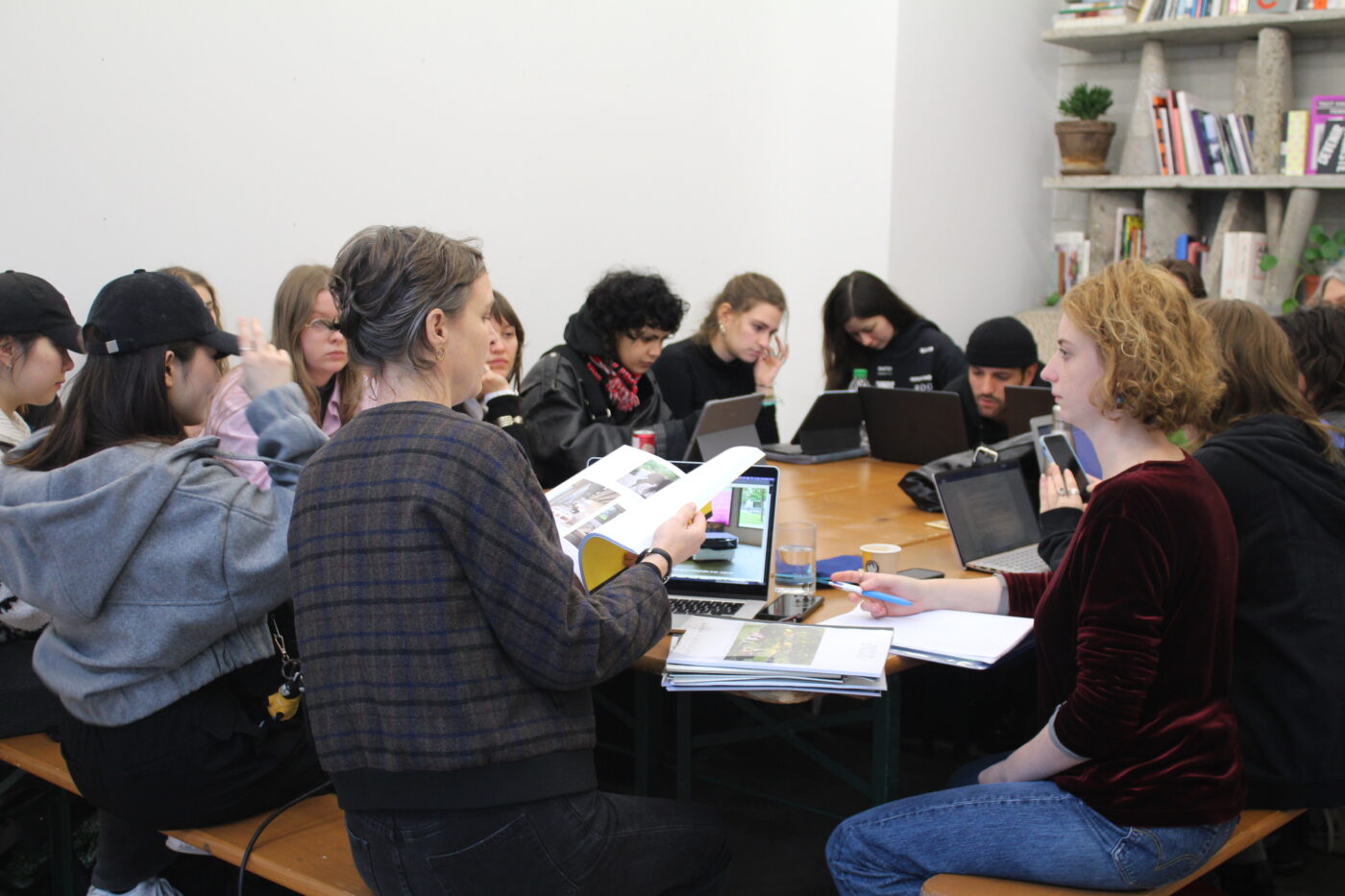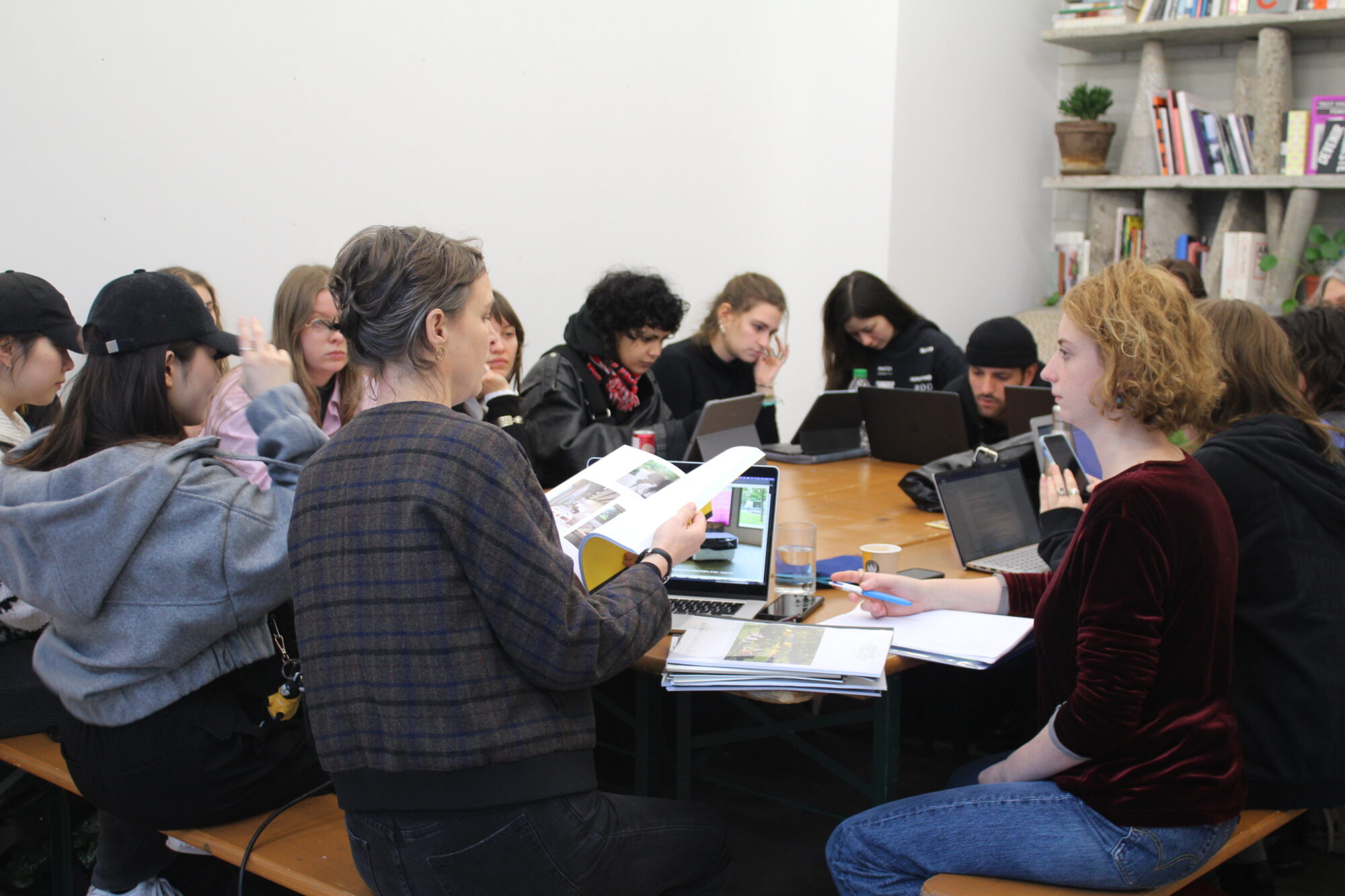
Public Presentation of the Project “A Year in the Life of an Art Center” carried out with students from the Master’s program in Visual Arts, specialization in Mediation, Exhibition, Critique – Université Paris 8 Vincennes–Saint-Denis
At 7pm: “Anti-Ableist Struggles and Working Methodologies in Art Centers”, a collective talk with Coline Ardouin, Lucas Fritz and Benoît Piéron.
As part of the program “A Year in the Life of an Art Center”, first-year Master’s students in Mediation, Exhibition, Critique from Université Paris 8 were hosted throughout the academic year at Bétonsalon – Center for Art and Research. Guided by their instructors Clélia Barbut and Nathalie Desmet, and supported by the center’s team, the students conducted an experimental investigation based on participatory observation of the center’s various activities: technical production, administration, audiences, programming, mediation, publishing, and curating.
This immersion led to the development of a collective project titled “Salonbéton”—a fictional and reflexive reinterpretation of the art center, shaped by the observations and questions raised throughout the year.
On Wednesday, May 28, Bétonsalon will host a public presentation of this experience through a variety of formats:
- A sound installation in public space, based on interviews with individuals who never or seldom visit Bétonsalon;
- A series of AI-generated images expressing collective imaginaries surrounding the center;
- A collective publication and collectible image cards, highlighting gestures and everyday fragments rarely visible within an art center.
The presentation will include a roundtable discussion from 7:00 to 8:30 PM, titled:
“Anti-Ableist Struggles and Working Methodologies in Art Centers”, with the participation of:
– Coline Ardouin, coordinator of pôle Art et Handicap 75, Souffleurs de Sens – Groupe SOS Solidarités
– Lucas Fritz, PhD in Communication Studies, artist-researcher, and neurodiversity activist, affiliated with EHESS and Paris Nanterre University
– Benoît Piéron, artist
This conversation will reflect on accessibility as a political issue at the intersection of artistic practices, academic research, and cultural policy.
Hedwig Houben’s exhibition “The Untamable Hand” will also be open to visitors during the event.
Coline Ardouin
Coline Ardouin is interested in the intersections between artistic creation, cultural heritage and themes of inclusion and equal opportunities. Trained as a curator-restorer of contemporary art, her research focused on the conservation of living organisms, particularly living plants, in contemporary installations. These areas of study stem from her sensitivity to current environmental and societal issues. She has worked to promote access to higher education for refugees and asylum seekers, and to support refugee artists in their integration into the Swiss art scene. She later specialized in cultural accessibility.
Coline Ardouin currently coordinates the Art and Disability 75 program at Souffleurs de Sens – Groupe SOS Solidarités. Issues of accessibility, inclusion, autonomy and artistic education are at the heart of Souffleurs de Sens’ concerns. The aim is to promote self-determination through access to culture as part of people’s lives. At Souffleurs de Sens, she leads the direction of the Art and Disability 75 ressource centre for professionals in the cultural and social sectors. She helps them to create arts and cultural education projects, provides training and raises awareness of cultural accessibility, and organizes professional gatherings. The Art and Disability 75 program is a part of IMAGO, the network of Art and Disability centres in the Île-de-Franc region – a space for sharing practices, methodologies and resources to promote access to culture for all.
Lucas Fritz
Lucas Fritz has a doctorate in information and communication sciences. His work focuses on the role of communication devices and their accessibility in shaping social movements around neurodiversity, and more broadly, on the links between technology, activism and neuro/psychological disabilities.
He has written for various political and academic journals, including Trou Noir, Multitudes and Terminal. He coordinates the Landing Zones research-creation project, which explores the politics of rest and neurodiversity in art schools.
Benoît Piéron
To the ailments endured throughout his long medical history, Benoît Piéron substitutes what he calls his ‘companion illness’, an expression that gives his acceptance an almost comforting quality. Benoît Piéron draws his materials from hospitals and medical environments and reappropriates them to open up other enchanting worlds, free of borders and far removed from the romantic heroism of the usual metaphors for illness.
His characteristic color palette, made up of pale yellows, sky blues, lilacs and pinks, which he composes in patchwork on mattresses, armchairs and other hangings, come from repurposed hospital sheets. By reclaiming them to create his works, the artist transports these historically charged fabrics to a more peaceful future, contrasting the often cold or even worrying atmosphere of the healthcare world.
Benoît Piéron’s vocabulary has grown out of his experiences of the slowed and distended time of illness, and its shrinking yet expansive space. His installations reflect his immobile journeys, the sensation of the body ‘in landscape format’, and the feeling of living ‘off-screen’. The reveries that emerge from these hospitable memories are all ways of protesting against ableist and productivist norms.
Un cursus mené avec le Master 1 Arts plastiques, parcours Médiation, Exposition, Critique de l’Université Paris VIII Vincennes Saint-Denis, conçu et accompagné par les enseignantes Clélia Barbut et Nathalie Desmet et par l’équipe du centre d’art.
